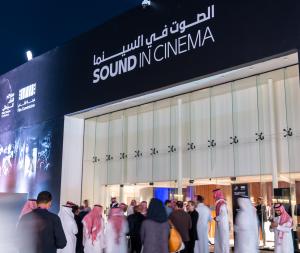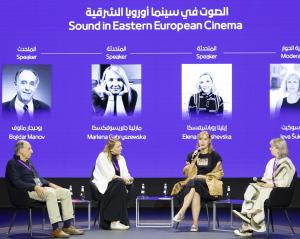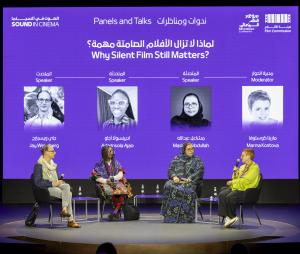The International Film Criticism Conference in Riyadh.. A Testimonial of An Ever-Growing Saudi Film Industry
RIYADH, SAUDI ARABIA, November 13, 2024 /EINPresswire.com/ — The Saudi capital, Riyadh, witnessed a major cultural event this November that transcended the cinema scene in the Kingdom and the region, by establishing a platform that brought together filmmakers and cinema pioneers with hobbyists and cinephiles
The Saudi Film Commission organized the International Film Criticism Conference from November 6 to 10, 2024, to explore “Sound In Cinema” – The main theme of the conference that was held to conclude and crown the achievements of the 2024 film criticism events, which included two film criticism forums, the first at Hail Province on September 27, and the second at Al-Ahsa province on October 25.
The conference focused on introducing film criticism concepts and applications, in addition to bringing together specialists and cinema lovers to exchange knowledge, and empower the national, regional and international movement in film criticism.
The conference brought together a group of cinema experts and hobbyists from around the world. To experience benefit from specialized presentations, panel sessions, masterclass sessions, and workshops, along with distinguished film screenings.
Films
The audience enjoyed watching a number of Saudi and international films throughout the conference, which embody distinguished stories, including: the Saudi film “Scales”, about the story of a strong-willed girl named “Hayat”, who lives in a poor fishing village governed by dark traditions in which every family must sacrifice one of its members to the sea creatures that live in the nearby waters, and in return; the sea creatures are hunted by the men of the village, and “Hayat’s” father saves her from this fate. “Red Desert” which is a 1964 psychological drama film set in northern Italy, following a troubled woman unable to adapt to her environment after a car accident.
The list of films also included Taipei Story, in which director Edward Yang talks about a world that is not his alone, but one that belongs to most of his peers, dealing with the character of Lung, an expatriate who suffers from a real identity crisis. “Under the Fig Tree” which takes place during the summer harvest season among the trees, where some fig pickers in a rural area in northwestern Tunisia share their secrets, love stories and disputes. “Pyaasa” a 1957 Indian drama film that focuses on the Urdu poet Vijay, who is disillusioned after publishers reduce his work in favor of writing about social issues instead of romantic topics.
The film screenings also included the film “Goodbye, Dragon” which revolves around characters whose stories we know but whose names we do not, and the documentary; “Daily Life in a Syrian Village,” a documentary film produced in Syria in 1974.
Master Class
The conference included two master classes, the first was about “Criticism between Cinema, Literature and Arts”, in which the Lebanese film critic Ibrahim Al-Aris spoke about his experience between translation, criticism and filmmaking, and how he benefited from this diverse experience, and his vision of film criticism as an attempt to understand what happens on the screen and in our lives, and that writing about cinema is a type of creativity, independent creativity, and not just analysis.
The other master class event was titled “50 Years of Criticism”, in which Egyptian film critic Kamal Ramzy spoke about his experience with cinema and film criticism and his professional career that began in 1968, driven by his passion for cinema, and the difficulties he faced that did not prevent him from choosing this profession that is dear to his heart. He touched on the function of sound effects in cinema and how they were used extensively to deepen the experience and convey the message of the film, which begins with the image and then comes the sound, the sounds of music or natural sounds, and other sound effects that serve the film’s transitions from one shot to another, considering that the most prominent Arab directors who used sound techniques brilliantly are: Henry Barakat, Salah Abu Seif, and Daoud Abdel Sayed.
Beyond Criticism
The Film Criticism Conference also included two presentations titled “Beyond Criticism”. The first event included an analytical presentation by Indian film critic Rita Dutta, entitled “Musicals & the Socio-Political History of India”. Where she spoke about the effects of Bollywood musical films on the social fabric of Indian society, and reviewed the dynamic relationship between Bollywood films and India, the ongoing lively debate between Bollywood musical films and the cultural, social, and perhaps political fabric of Indian society, the mutual influences between them, and the resulting alternating changes that India went through before and after its independence and up until the present time. Critic Dutta also traced the history of Bollywood musical films, from the 1950s to modern films, to confirm that the sound in Bollywood films is the voice of India, evolving with it, experiencing its transformations, and contributing to them.
The second Beyond Criticism presentations, titled “Spectating in the Blind: Film Sound and Non-Western Philosophy,” featured Malaysian film director and scholar Matthew Tan, who spoke about the impact of environmental philosophy and environmental awareness on filmmaking in Malaysia, and how direct experiential understanding rather than cognitive interpretation has led to a renewed sense of engagement.
Symposia
The conference also included a series of enriching symposia, including “Why Silent Film Still Matters?”, moderated by Macedonian journalist and film critic Marina Kostova, with the participation of Saudi writer and film critic Mashael Abdullah, Nigerian film critic Aderinsola Ajao, and historian and film critic Jay Weissberg.
Participants in the silent cinema symposium agreed on the historical role played by silent cinema in making those interested in the seventh art understand the dimensions of current cinema. They criticized those who describe silent cinema in a negative way, stressing that if it were not for silent cinema, many things would have prevented the development of cinema as we see it today.
There was also a symposium on “Sound in the Cinema of Saudi Arabia” in which writer and critic Dr. Ali Zaala, film critic Mohammed Al-Basheer, and Saudi director Sarah Mesfer participated. It was moderated by Saudi producer and director Ali Al-Sarheed. The participants emphasized that sound represents half of the film, and that the invention of sound and its introduction into the film is similar to the invention of writing, which is what made cinema leap forward and develop until it reached the state we see it in now. They also touched on the uniqueness of Saudi films and how they distinguished themselves in using natural sounds to provide a quality experience.
“Woman Voice in Tunisian Cinema” is the title of a presentation in which Tunisian critic Rihab Boukhayatia confirmed that the status of women was a concern for the first generation of female directors, as is the case for the directors of the new generation, as it is the common denominator between them despite the difference in approach.
Under the title “Italian Composers’ Unique Contribution to Film,” Italian film critic Paola Casella spoke about Italian film soundtrack composers and how they contributed to the advancement of distinctive experiences through their broad cultural background, ability to innovate, emotional impact, operatic grandeur, loyalty to directors, diversity of musical styles, courage to experiment, curiosity, ability to “read” the script and find its heart, and to soar at the peak of the rhythm and then descend to a sweet, diminishing note.
Through a presentation titled “Robert Sahakyants: An Armenian Legend”, Armenian film critic Diana Martirosyan spoke about Armenian animation director Robert Sahakyants, whose films were distinguished by their uniqueness and creativity, which earned him the title of Honored Art Worker of Armenia, and whose animation “The Lesson” won an award at the Soviet Film Festival.
Another presentation, titled “How the Sound of a Pocket Watch Redefined the Role of Music in Cinema” by Brazilian film critic Marcelo Janot, who addressed the question by talking about the collaboration between director Sergio Leone and composer Ennio Morricone, and how the narrative and non-narrative use of the sound of a watch in some of their films revolutionized the language of Western films, extending time and increasing narrative suspense, as was evident in the film “For a Dollar More,” released in 1965.
On “Sound as the Heart of Liberation War Films of Bangladesh,” Bangladeshi writer and film critic Bidhan Rebeiro talked about the use of sound effects in a number of films that coincided with his country’s liberation war that began in December 1971, including Stop the Genocide (1971) by Zahir Raihan, and They Are Eleven (1972) by Chashi Nazrul Islam.
About “Music in Malagasy Films,” Madagascar-based journalist and film critic Domina Ratsara gave a presentation on the social role of music and its use as a means of cleansing, promoting and encouraging social connection, increasing empathy, educating and facilitating social life. She explained that during the political unrest in Madagascar, music played a pivotal role. In 1972, the post-independence movement used songs to connect people together in a commitment to a better future. The famous song “Mahalio” was born during those unrest. Songs contributed to promoting freedom of expression and empowering society to challenge the status quo and change the course of events. Artists involved in political movements were recognized as voices calling for change.
“The Soundless Bodies of Thai Films from the 1960s” is the title of a presentation by Thai film critic Kong Rithdee on a number of Thai silent films from the late 1940s to the early 1970s, which were made in a cost-effective and quick-production manner. These films were shot without sound, no sound was recorded on camera although the actors spoke dialogue, and the acting style was a mix of silent and talkie styles. The era of the silent film genre ended in 1970. Since then, Thai cinema has adhered to the standard practice of sound films, decades behind most of the world.
Polish film critic and animation director Ola Salwa gave a presentation titled “Solaris mon amour: Solaris, Mon Amour: How Sound Can be A Leading Narrative in A Found Footage Polish Documentary?” The presentation included a quick analysis of the documentary Solaris, Mon Amour, co-written by a director, editor, sound designer and music director, and included footage taken from educational films produced between 1952 and 1982.
Workshops
“Shaping Cinema: The Art Of Curation Through Criticism” was the title of a workshop led by South African film critic Taryn Joffe, which sought to explore how film critics influence the film industry ecosystem, how to enhance festival programming with analytical skills, craft engaging program notes, collaborate with programmers to enrich the culture of cinema, through critical analysis techniques to raise the level of film festival programming, demonstrate how to create compelling program notes that attract audiences, and present an effective approach to curation.
Another workshop titled “From Video Essays to Podcasts and Back Again” was presented by the director and founder of the Cinematology channel on YouTube, and Egyptian podcaster Mohamed Abousoliman. It discussed the podcast industry and its goals of developing a digital presence, communicating with industry professionals, talking about films, and honing narration and filmmaking skills. Abu Suleiman listed the elements of podcasting, which include creating a structure for the video script, identifying talking points, choosing a guest or co-host, determining the recording space, and focusing on controlling time and always improving performance.
Another workshop on podcasting was presented by podcast host and founder of “afikra” Mikey Muhanna, a semi-daily program about the reality of social life in the Arab world. The workshop, titled “Podcasts and Critical Conversations about Film & Culture,” discussed the “afikra” podcast and the art of podcast interviews, which includes choosing a general topic, recording, editing and post-production, recording press, distribution and publishing, audience building, and choosing topics and angles. The workshop included a question and answer session, where the presenter said that “afikra” is a movement that aims to transform passive interest in the Arab world into active intellectual curiosity, and to collectively reshape the prevailing narrative in the region by exploring the history and cultures of this place – past, present and future – through curiosity-driven conversations.
Saudi director and writer Sara Balghonaim presented a workshop titled “Writing Short Films,” which she began by defining the types of short films classical, nonclassical, experimental/poetic, reflective, coming-of-age…, and the tones she describes: absurd, : absurd, melancholic, quirky…, and their structure based on character and plot. Balghonaim identified the difference between a short film and a feature film, which can be summarized as the short film presents a brief, simple background story that requires immediate engagement, and the audience does not have the full history of the film’s events, giving priority to the current event and conflict, while developing the character and making less room for building the world on a large scale, which can include historical or fictional background stories.
Cinematic activities for children
The Film Criticism Conference included a number of educational activities targeting children in an effort to enrich them with cinematic culture and discover talents among them from a young age, including film screenings and workshops.
The first workshop was titled “Writing a Cinema Scene Script,” and was presented by Saudi artist and director Ithar Baamer. It aimed to stimulate imagination and creativity among children, develop their writing and expression skills, and enhance their ability to observe and detail. The workshop is based on transforming a specific image or shot into a scene that is accurately written. The workshop begins by showing the participants a picture, which should contain situations or characters that can be used dramatically.
The second workshop was presented by Lebanese artist and musician Sahar Khoury, under the title “Sound from Nature”, an interactive workshop for children on making sounds using materials found in nature. It is a fun and educational activity that encourages children to explore the world of sound in an innovative way. The workshop aimed to enhance the imagination and auditory taste of children and youth, develop cooperation and teamwork skills, explore sound and art, and develop motor skills.
The third workshop was presented by Tunisian trainer and film programmer Nawras Al Ruwaisi, entitled “How to Watch Movies”. It is an interactive workshop based on showing a short film suitable for children’s ages, containing artistic messages. After the screening, the children are directed to an open discussion led by the trainer. The workshop aimed to raise the expressive ability and artistic taste of cinema among young men and women, and to enhance their critical thinking and visual and artistic understanding.
The conference comes within the scope of the work of the Saudi Film Commission, which comes under the umbrella of the Ministry of Culture, as it enhances the pace of growth of cinema in the Kingdom, due to its role in cultural, social and economic prosperity. The Film Commission works to achieve its goals through various paths, including developing talents and implementing qualitative events.
————–
————–
email us here
Legal Disclaimer:
EIN Presswire provides this news content “as is” without warranty of any kind. We do not accept any responsibility or liability
for the accuracy, content, images, videos, licenses, completeness, legality, or reliability of the information contained in this
article. If you have any complaints or copyright issues related to this article, kindly contact the author above.
![]()








